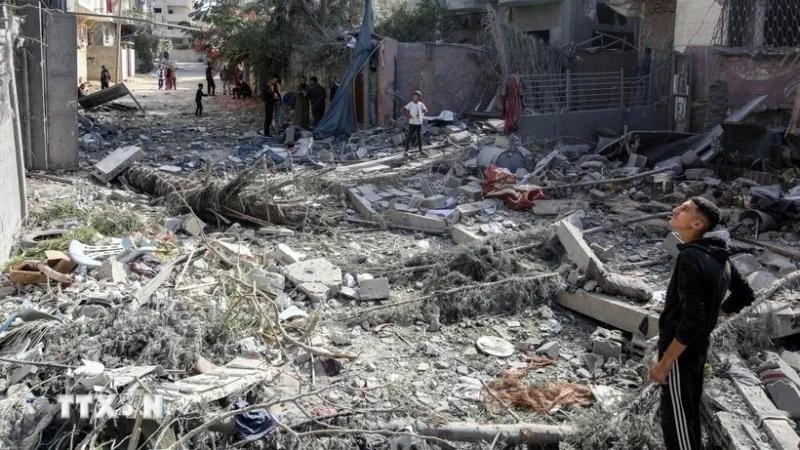A glimmer of hope in the Middle East
The mediating efforts of the US and France, along with the international community, have led to a ceasefire agreement between Israel and the Hezbollah militant group in Lebanon. This agreement opens up the hope of ending the longest and bloodiest conflict between the two sides in decades while also preventing a serious humanitarian crisis that was at risk of spreading throughout the region.
 |
| The houses were destroyed by an Israeli airstrike in the al-Bureij refugee camp of the central Gaza Strip on November 17, 2024. |
The ceasefire between Israel and the Hezbollah militant group of Lebanon came into effect on November 27 under an agreement mediated by the US and France. The ceasefire aims to allow people in both countries to begin returning to their homes in the war-torn border areas after 14 months of fighting. According to the terms of the ceasefire, Israeli forces have 60 days to withdraw from southern Lebanon, and neither side is allowed to carry out any offensive activities.
Titled “A Cessation of Hostilities and Related Commitments on Enhanced Security Arrangements and Towards the Implementation of the United Nations Security Council Resolution (UNSCR) 1701,” the agreement is hoped to pave the way and create conditions for subsequent efforts to ease tensions in the Middle East following several months of negative developments. UNSCR 1701 aims to restore peace along the Lebanon-Israel border following the 2006 war.
With the ceasefire agreement, Israel's northern regions are expected to calm after enduring several days of heavy rocket and drone attacks launched by Hezbollah. Meanwhile, in Lebanon, thousands of displaced citizens can return home. Immediately after the ceasefire, thousands of Lebanese citizens crossed the Jdeidet Yabous border checkpoint between Syria and Lebanon to return home. The Syrian government reopened this checkpoint after repairing damage caused by Israeli airstrikes. However, Israel has warned that citizens should not return to areas near the border until it is truly safe. The Israeli military has imposed a curfew at night in southern Lebanon.
The risk of a widespread humanitarian disaster in the region has been temporarily halted. Humanitarian organisations and United Nations partners have mobilised resources providing aid and support to the people. On the first day of the ceasefire, 11 United Nations High Commissioner for Refugees (UNHCR) trucks delivered emergency relief to over 3,000 people in Baalbek. The United Nations Children's Fund (UNICEF) continues to support children affected by the conflict.
However, this temporary ceasefire agreement remains fragile and faces numerous practical challenges. It is an agreement between the Israeli and Lebanese governments, requiring both sides to return to the terms outlined in UNSCR 1701. Before the outbreak of the current conflict, this resolution had already been violated, and in theory, Israel and Lebanon are still in a state of war. Meanwhile, the agreement stipulates that the Lebanese military will deploy forces in southern Lebanon, where both Israel and Hezbollah forces will withdraw. It remains uncertain whether the Lebanese forces can maintain security in this area.
Another issue is that a controversial clause was included in the agreement, which states that "Israel retains the right to self-defence following international law". This means that the agreement could be broken at any time if Israel is attacked again by Hezbollah or if Israel perceives an imminent threat and decides to carry out a preemptive strike.
Despite many challenges, the temporary ceasefire between Israel and Hezbollah is still welcomed as a positive step, igniting a spark of hope in the effort to prevent the conflict from spreading further across the Middle East. The international community also hopes similar agreements will be reached in Gaza. However, the crucial point now is for all parties to fully and strictly adhere to the ceasefire, allowing for humanitarian activities and the continuation of negotiations, bringing peace and stability to the entire region.
NDO





READER COMMENTS